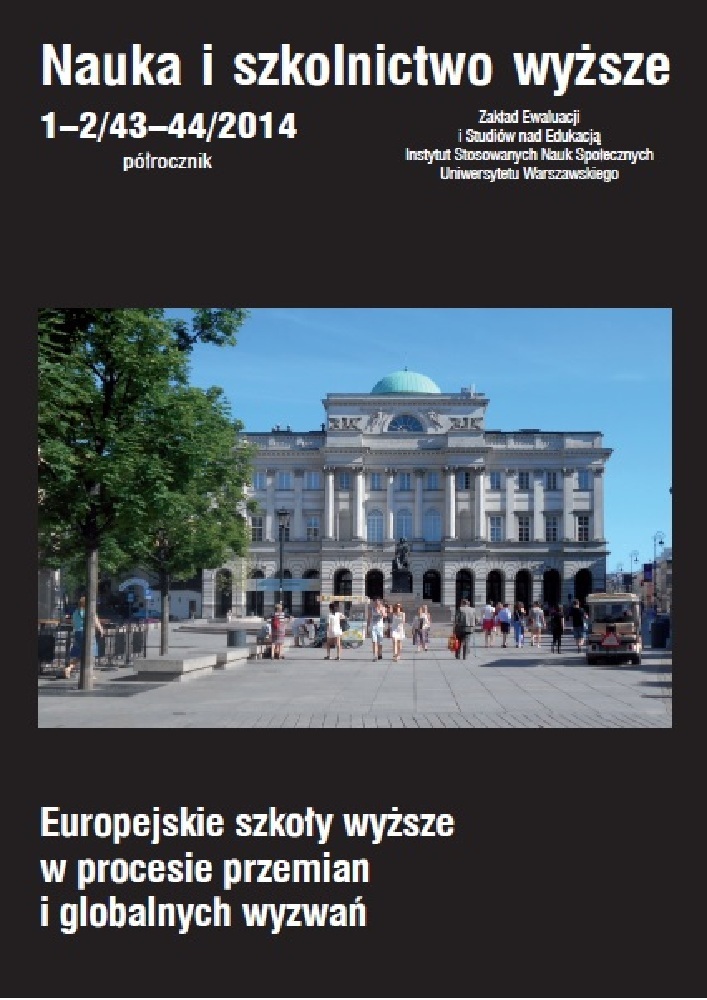Abstrakt
Na potrzeby stawienia czoła wyzwaniom globalizacji w krajach nordyckich uczyniono z tego zjawiska punkt węzłowy dyskursu modernizacji, co przełożyło się na debaty toczone w tych krajach w ramach tzw. strategii globalizacyjnych w latach 2002–2009. Dzięki zaangażowaniu wielu partnerów społecznych i aktywnemu dialogowi z udziałem przedstawicieli rządu, pracodawców i pracobiorców, jak też związków zawodowych i organizacji pozarządowych, globalizacja przestała być straszakiem w debacie publicznej, a zaczęto ją postrzegać jako wyzwanie i szansę dalszego rozwoju. Za główny sposób radzenia sobie z globalizacją uznano większe otwarcie i dostosowanie nordyckich gospodarek narodowych do globalnych trendów, wykorzystując przy okazji dyskurs strategicznego umiędzynarodowienia do stymulowania zmian społecznych, gospodarczych i politycznych. Artykuł traktuje o sektorze szkolnictwa wyższego, który został wprzężony w realizację strategii umiędzynarodowienia, a który jednocześnie przeszedł metamorfozę dostosowującą go do nowych realiów, podobną do innych sektorów realizujących politykę publiczną.Bibliografia
Ahola S. 2005. Global and Local Priorities in Higher Education Policies: A Headache at the National Level?, „Tertiary Education and Management”, nr 11, s. 37–53.
Ásgrímsson H. 2006. Globalisation: Realising the opportunities (http://eng.forsaetisraduneyti.is/minister/Speeches_HA/nr/1732 [dostęp 18.12.2012]).
Carey D. 2009. Iceland: The Financial And Economic Crisis, „Economics Department Working Paper”, nr 725, OECD, Paris.
Christensen T., Lægreid P., Roness P.G., Røvik K.A. 2007. Organization Theory and the Public Sector. Instrument, culture and myth, Routledge, London.
Due J. 2009. Danske universiteters fremtid i en globaliseret verden, w: H. Sander (red.): Fremtidens universiteter, Gyldendal, København, s. 68–78.
Enders J. 2004. Higher education, internationalisation, and the nation-state: recent developments and challenges to governance theory, „Higher Education”, nr 47, s. 361–382.
Fejerskov O., Kringelbach M. L. 2009. Indsigt og udsyn – et internationalt perspektiv på fremtidens danske universiteter, w: H. Sander (red.): Fremtidens universiteter, Gyldendal, København, s. 93–108.
Frølich N. 2008. Justification and Drivers. Higher Education Institutions’ Strategies of Internationalisation, w: Å. Gornitzka, L. Langfeldt (red.): Borderless Knowledge. Understanding the “New” Internationalisation of Research and Higher Education in Norway, Springer, Dordrecht, s. 103–124.
Gornitzka Å. 2008. The internationalisation of research and Higher Education. Changing Borders of Knowledge, w: Å. Gornitzka, L. Langfeldt (red.): Borderless Knowledge. Understanding the “New” Internationalisation of Research and Higher Education in Norway, Springer, Dordrecht, s. 1–11.
Globaliseringsrådet 2009. Bortom krisen. Om ett framgångsrikt Sverige i den nya globala ekonomin, Globaliseringsrådet, Stockholm.
Högskoleverket 2005. The internationalisation of higher education in Sweden, „Högskoleverkets Rapportserie”, nr 27, s. 71.
Kerr C. 1990. The Internationalization of Learning and the Nationalization of the Purposes of Higher Education: Two Laws of Motion in Conclict?, „European Journal of Education”, nr 25(1), s 5–22.
Kubka A. 2009. Demokratyczne systemy narodowe państw skandynawskich wobec wyzwań globalizacji (na przykładzie Szwecji), w: K. Kamińska, S. Mrozowska, G. Piwnicki (red.): Państwa – regiony – świat w kształtującej się rzeczywistości globalnej, Wydawnictwo Uniwersytetu Gdańskiego,Gdańsk, s. 249–250.
Lunds Universitet 2007. Policy för internationalisering vid Lunds universitet 2008–2011, Lunds Universitet, 17 grudnia (http://www.lu.se/upload/LUPDF/intsek/International_Policy/Policy_for_internationalisering_2008_11.pdf [dostęp 12.01.2013]).
Ministry of Education 2009. Strategy for the Internationalisation of Higher Education Institutions in Finland 2009–2015, Publications of the Ministry of Education, Helsinki, s. 23.
NHO 2006. Norge i verden. Invitasjon til dialog om hvordan Norge forblir en global vinner, NHO, Oslo (http://www.nho.no/files/NHO_Policy_Lang_Siste22_12.pdf [dostęp 14.12.2012]).
OECD 2009. Education, Research and Innovation policy A new direction for Iceland, OECD, Paris.
OPM 2001. Korkeakoulutuksen kansainvälisen toiminnan strategia, Opetusministeriön työryhmien muistioita, Helsinki, s. 23.
Prime Minister’s Office 2004. Finland’s competence, openness and renewability. The final report of the ’Finland in the Global Economy’ project, Prime Minister’s Office, Helsinki.
Prime Minister’s Office 2006. A renewing, human-centric and competitive Finland. The National Knowledge Society Strategy 2007–2015, Information Society Programme, Prime Minister’s Office, Helsinki.
Regeringen 2006. Fremgang, Fornyelse og Tryghed. Strategi for Danmark i den globale økonomi – de vigtigste initiativer, Statsministeriet, København.
Stensaker B. i in. 2008. Internationalisation of higher education: the gap between national policy-making and institutional needs, „Globalisation, Society and Education”, nr 6(1), s. 1–11.
Stier J. 2004. Taking a critical stance toward internationalization ideologies in higher education: idealism, instrumentalism and educationalism, „Globalisation, Society and Education”, nr 2(1), s. 83–97.
Stiglitz J.E. 2006. A Progressive Response to Globalization, „Nation”, nr 282(15), s. 18–20.
St. meld. nr. 7… 2008–2009. Et nyskapende og bærekraftig Norge, Nærings- og handelsdepartementet, Oslo.
St. meld. nr 9... 2007–2008. Norsk politikk for forebygging av humanitære katastrofer, Utenriksdepartementet, Oslo.
St. meld. nr 9... 2008–2009. Perspektivmeldingen 2009, Finansdepartementet, Oslo.
St. meld. nr 10... 2008–2009. Næringslivets samfunnsansvar i en global økonomi, Utenriksdepartementet, Oslo.
St. meld. nr 13... 2008–2009. Klima, konflikt og kapital – Norsk utviklingspolitikk i et endret handlingsrom, Utenriksdepartementet, Oslo.
St. meld. nr 14... 2008–2009. Internasjonalisering av utdanning, Kunnskapsdepartementet, Oslo.
St. meld. nr 15... 2008–2009. Interesser, ansvar og muligheter. Hovedlinjer i norsk utenrikspolitikk, Utenriksdepartementet, Oslo.
St. meld. nr 18... 2007–2008. Arbeidsinnvandring, Arbeids- og inkluderingsdepartementet, Oslo.
St. meld. nr. 19... 2002–2003. En verden av muligheter – globaliseringens tidsalder og dens utfordringer, Utenriksdepartementet, Oslo.
St. meld. nr 34... 2006–2007. Norsk klimapolitikk, Miljøverndepartementet, Oslo.
St. prp. nr 48... 2007–2008. Et forsvar til vern om Norges sikkerhet, interesser og verdier, Forsvarsdepartementet, Oslo.
Svensson L., Wihlborg M. 2010. Internationalising the content of higher education: the need for a curriculum perspective, „Higher Education”, nr 60(6), s. 595–613.
Teichler U. 2002. Internationalisierung der Hochschulen, „Das Hochschulwesen”, nr 50(1), s. 3–9.
Tjomsland M. 2004. Internationalization at Norwegian Universities and Colleges after the Quality Reform, Stein Rokkan Centre for Social Studies, Bergen.
UMB 2011. Norwegian University of Life Sciences (UMB) Strategic Action Plan for Internationalization 2011–2014, UMB, Oslo.
Utenriksdepartementet 2009. Bidrag fra fagmiljøene, „Globale Norge – hva nå?” (http://www.regjeringen.no/nb/dep/ud/kampanjer/refleks/innspill.html?id=478948 [dostęp 12.01.2013]).
